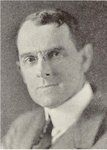Whitehead, John B.

John Boswell Whitehead was born in Norfolk, Virginia, on 18 August 1872, son of Henry Colgate and Margaret Walke (Taylor) Whitehead. He received his education at Norfolk Academy and attended Johns Hopkins University, where he was granted the degrees of B.E. in 1893, B.A. in 1898, and Ph.D. in 1902. Meanwhile, during 1893-96 he was an electrical engineer with the Westinghouse Electric & Manufacturing Co. in Pittsburgh, Pa., and in 1896-97 he was with the Niagara Falls (N.Y.) Power Co. In 1898 he joined the faculty of Johns Hopkins University as instructor in applied electricity. He was made associate in 1900 and associate professor in 1904, and in 1910 he became professor of electrical engineering. In 1920 he was named dean of the School of Engineering, which he had helped to organize in 1912, and in 1938 he was named director of the school. He retired in 1942 as professor emeritus.
In addition to his work at the university, Whitehead was a laboratory assistant in the U.S. Bureau of Standards in 1902 and a research assistant at the Carnegie Institution, Washington, D.C., during 1902- 05. When the United States entered the First World War in 1917, he was commissioned major in the U.S. Army Corps of Engineers and was employed in research work for the Naval Consulting Board with the objective of developing methods to detect enemy submarines. During the Second World War period he acted as an advisor to the Navy in developing measures to protect U.S. ships against magnetic mines, and he worked with the Air Force in the field of electronics research. Following his retirement in 1942 he continued in the latter field in his laboratory at Johns Hopkins, and his last project for the Air Force was completed shortly before his death. During his active career Whitehead served as an engineering consultant on the electrification of several railroad lines. He contributed many papers dealing with results of his research work in the field of high-voltage insulation to the scientific journals, and he was author of four books: The Electric Operation of Steam Railways (1909), Dielectric Theory and Insulation (1927), Impregnated Paper Insulation (1935), and Electricity and Magnetism (1939). Whitehead was awarded the triennial prize of the Montefiore Electrotechnic Institute of Liege, Belgium, in 1922 and 1925, and the medal of the University of Nancy, France, in 1927. The Franklin Institute awarded him its Elliott Cresson Gold Medal in 1932 in recognition of his many original investigations of dielectric behavior and allied subjects in the field of high-voltage insulation, and in 1941 he received the Edison Medal of the American Institute of Electrical Engineers "For his contributions to the field of electrical engineering, his pioneering and development in the field of dielectric research, and his achievements in the advancement of engineering education." In addition, he was the recipient of the medal of meritorious achievement of the Advertising Club of Baltimore in 1933, and in 1948 Whitehead Hall, a science building named in his honor, was dedicated at Johns Hopkins University. He was a member of Phi Beta Kappa. Whitehead was a fellow of the American Association for the Advancement of Science, American Institute of Electrical Engineers (pres. 1933-34), and the American Physical Society, and he was a member of the National Academy of Sciences, National Research Council, French Society of Electricians, Tau Beta Pi, and Delta Phi.
Apart from his profession, music was Whitehead's chief interest. He was married in Baltimore, 13 April 1903, to Mary Ellen. They had three daughters: Clara, Margaret Walke, and Joan Boswell. Whitehead died in Baltimore, MD, on 16 November 1954.
| Disclaimer: This article is taken wholly from, or contains information that was originally published by, the Institute of Electrical and Electronics Engineers, Inc.. Topic editors and authors for the Encyclopedia of Earth may have edited its content or added new information. The use of information from the Institute of Electrical and Electronics Engineers, Inc. should not be construed as support for or endorsement by that organization for any new information added by EoE personnel, or for any editing of the original content. |